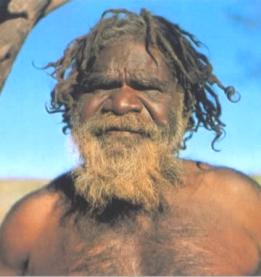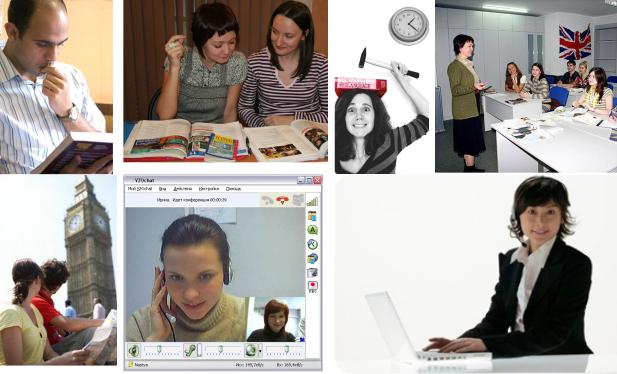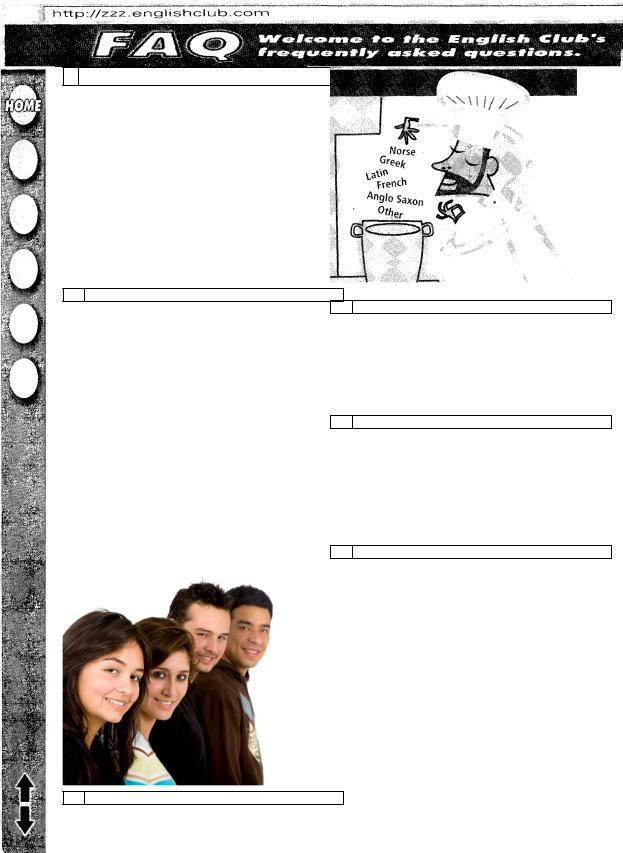
зеленый
.pdf
Maria Sharapova Born in ___ (date), in ___(country)
Age when she started tennis: ___ years old
Age nine: moved to ___
Off-court interests: 1_____2_____3_____
Championships: _____
At the age of seventeen, Maria Sharapova won the Wimbledon tennis championship. She was the third youngest champion in Born in 1987 in a small Siberian town, Maria started hitting tennis balls at the age of four. Her first tennis teacher was her father, Yuri Sharapov. When Maria was nine, she and her father moved to America. She went to a special tennis school in Florida, where she practised every
day.
Maria’s mother had to stay at home in Russia. Maria didn’t see her for two years. She missed her mother and her family. But now this tall, good-looking young woman is the Number 2 player in the world.
Playing tennis is not Maria’s only interest. She does not go to high school but she studies all her school subjects through an Internet school.
Wimbledon’s 118-year history. This success quickly made her one of the world’s best-known sports celebrities.
She enjoys reading. The Sherlock Holmes stories are among her favourite books. Her other off-court interests are fashion, singing, dancing and movies. In 2005, Maria designed her tennis dress for the championships, and she produced a new perfume.
However, Maria’s main love is still tennis. She often plays charity matches to raise money for people in need, and she practices hard to be a champion.
‘Everyone’s trying to beat the World’s Number 2 player’, she says. ‘It’s absolutely normal. But I want to beat them as well. I love the competition.’
7b Choose a famous person and write his/her biography (160-200 words). Include the following:
When / where he/ she was born
Why he/she became famous
Family, interests, hobbies
82

Unit 8
Languages and Communication
In this module you will:
Read about fate of languages
Talk about your native language, ways of learning languages
Test your knowledge about world languages
Practise using modals (can, be able to) and their equivalents
Listen to an interview
Write a letter to a friend
Learn how to write SMS in English
Useful vocabulary:
Nouns |
community, effect on smth, texting |
Verbs |
to disappear, to save, to survive, to destroy, to care, to say, to talk, |
|
to speak, to tell, to study, to revise, to practise, to improve, to |
|
socialize, to communicate, to prevent from, to decipher, to affect, |
|
to express oneself |
Adjectives |
rare, unique, old-fashioned, close to |
Phrases and |
native speakers, spoken language, first language, official |
collocations |
language, to have a proper conversation, correct English, means of |
|
communication, |
Linkers |
because of, all in all, according to, reason why |
83

1. Lead-in
1a Do you know what languages the people in these countries speak? Choose from the table on the right.
1 official |
2 or more official |
language |
languages |
France→ |
Canada→ |
China→ |
Switzerland→ |
Portugal→ |
Belgium→ |
Spain→ |
India→ |
Australia→ |
Belarus→ |
French Chinese Portuguese
Spanish Hindi English
Italian Russian German
Flemish(Dutch) Hungarian
Belarussian Japanese Ukrainian
Bengali Arabic
1b How much do you know about the world’s major languages? Try the quiz below.
Test your knowledge
1.Approximately how many languages are there in the world? a 6,500 b 16,500 c 1,500
2.Order the world’s top 5 languages according to the number of native speakers.
|
|
Chinese |
English |
Spanish |
Japanese |
Bengali |
|
|
Russian |
Hindi |
Arabic |
Portuguese |
German |
3. |
How many people speak English as a first, second or third language? |
|||||
|
a 0.5 billion b 2 billion |
c 1.5 billion |
|
|||
4. |
How much of the world’s e-mail is written in English? |
|
||||
|
a 60% |
b 70% |
c 80% |
|
|
|
5. |
How many Languages disappear every year? |
|
||||
|
a 5 b 20 |
c 15 |
|
|
|
|
2. Reading
Pre-reading activities
2a Look at the picture in the text below and guess who the person might be. Look at the key words below and guess the topic of the text.
lonely(adj) die (v) language (n) disappear (v) speaker (n) save (v) rare (adj)
While-reading activities
2b Read the article and match the topic a-f with paragraphs 1-6.
a |
What communities can do |
|
. |
|
|
|
|
|
|
|
|
|
b |
The number of languages in danger |
. |
|
|
|
|||||||
c |
The last speaker of his language |
|
|
|
. |
|
|
|
|
|
|
|
d |
The most important reason why |
languages are dying |
. |
|||||||||
e |
Languages and natural disasters |
|
|
. |
|
|
|
|
||||
f |
What happens when languages |
die |
|
. |
|
|
|
|||||
84

1 Maluerindi (a name which means 'Running Water') is lonely because he has nobody to talk to, but his loneliness won't change - he is the last person in the world who can speak his Aboriginal language. 'It's sad,' he says, 'but there's nothing we can do about it now.'
2 Experts who study languages say that there are 51 other languages with just one speaker left - 28 of them in Australia. These languages are so close to dying that nobody can save them. The experts tell us that out of the world's 6,000 languages, 3,000 will disappear in the next 100 years.
3 There are many reasons why languages die. Sometimes natural disasters such as earthquakes, floods or hurricanes suddenly destroy small groups of people who live in far away places. Sometimes the weather changes and there isn't enough food, and sometimes strangers bring new diseases.
4 But disasters like these are not the biggest danger, and do not tell us why languages are disappearing faster than ever before. The real problem comes from the big world languages such as English, Spanish, Portuguese and French. Today, mainly because of America, English is the first world language, and it is very hard for smaller languages to survive.
5 There are things that small communities can do to save a language, but they need time and money. First, people need to record the language and write it down. Then they need to train teachers, and write grammar books, dictionaries and books for schools.
6 We should care about languages that are in danger just as we should care about rare plants and animals. When a language dies it is not like when a civilization such as the ancient Greeks or Egyptians die. They leave behind buildings like the pyramids in Egypt and Parthenon in Greece - there is always something to show that they were there. But a spoken language leaves nothing behind - when it dies, there is only silence.
Post-reading activities
2c Read the article again and answer these questions using your own words.
1What does Maluerindi think we can do about his loneliness?
2What is going to happen in the next 100 years?
3Why do languages die?
4What can people do to save a language?
5Why should we care when languages die?
85

3. Language skills
|
|
Vocabulary |
|
|
||||
3a Find these verbs in the article |
3 |
‘It’s sad,’ he |
|
, ‘but there’s |
||||
and match them to their meanings |
nothing we can |
do about it |
now.’ |
|||||
in this context. |
4 |
The experts |
|
us that out of |
||||
1 |
change |
damage something badly |
the world’s 6,000 languages, 3,000 will |
|||||
2 |
disappear |
stop existing |
disappear in the next 100 years. |
|||||
3 |
destroy |
live after a difficult event |
|
Which word means to know a |
||||
4 |
survive |
stop something dying |
|
language? |
|
|
||
5 |
save |
be interested in something |
|
Which word means to have a |
||||
6 |
care |
become different |
|
conversation with? |
||||
Choose three of the verbs and write |
|
Which word means to give |
||||||
|
information to someone? |
|||||||
three sentences about the problem |
|
Which word is used to describe |
||||||
of dying languages. |
|
someone’s actual words? |
||||||
3b Complete these sentences with the correct form of say, talk, speak or tell.
1 |
He is lonely because he has nobody |
|||
to |
|
to. |
|
|
2 |
He is the last and only person in |
|||
Australia who can |
his |
|||
Aboriginal language. |
|
|
||
3c Fill in the missing words.
Verbs |
Nouns |
study→ |
student |
revise→ |
|
practise→ |
←repetition |
|
|
|
←memory |
|
←translation |
3d Complete the following sentences. Use the words in the box.
1 |
|
|
|
|
|
2 |
|
|
|
|
|
|
3 |
|
|
|
|
|
||
‘For me, learning English |
In general, I want to: |
In particular, I need |
||||||||||||||||||
is |
|
|
.’ |
|
|
|
|
|
|
|
|
|
English for: |
|||||||
|
|
|
|
|
|
|
|
|
|
|
|
|
|
|
|
|
|
|
|
|
|
|
|
|
|
|
|
learn |
write |
read |
|
|
|
taking writing giving |
|||||||
|
|
a pleasure |
a |
|
|
|
||||||||||||||
|
|
|
improve feel |
make |
|
|
|
|
socialising travelling |
|
||||||||||
|
|
nightmare |
an |
|
|
|
|
|
|
|||||||||||
|
|
a |
|
more confident |
g |
|
|
on business and |
||||||||||||
|
|
opportunity |
a pain |
|
|
|||||||||||||||
|
|
|
|
|
|
|
|
|
|
|
|
|
|
|
|
|
||||
|
|
when I speak. |
|
|
holidays. |
|||||||||||||||
|
|
an investment |
a |
|
|
|||||||||||||||
|
|
b |
|
|
my |
listening |
h |
|
|
e-mails, letters and |
||||||||||
|
necessity |
an effort |
|
|
|
|
||||||||||||||
|
|
|
|
|
||||||||||||||||
|
a problem |
a hobby |
skills. |
|
|
|
|
|
faxes. |
|||||||||||
|
|
|
|
|
|
c |
|
|
lots of new |
i |
|
|
with friends and |
|||||||
|
|
|
|
|
|
|||||||||||||||
|
|
|
|
|
|
|
vocabulary. |
|
|
|
|
colleagues. |
|
|
||||||
|
|
|
|
|
|
d |
fewer |
grammar |
j |
|
|
|
part in |
|||||||
|
|
|
|
|
|
|
mistakes. |
|
|
|
|
|
|
conferences. |
|
|||||
86

e |
|
|
|
better, clearer |
k |
|
short |
|
English. |
|
|
presentations. |
|||
f |
|
|
without using a |
|
|
|
|
|
dictionary |
so much. |
|
|
|
||
3e These pictures show different ways of learning a language. In pairs discuss what they show.
decide together which ways are the most helpful for learning a language
say which activities you do, or would like to do
ask about your partner’s experience
discuss your reasons for learning a language
3f Look at two columns below. In which column is it possible to use can or be able to after the words? Finish the sentences using your own ideas about learning languages.
My brother |
|
_____________. |
|
|
I want to |
_______________. |
||||||
I |
|
|
|
. |
|
|
|
. |
||||
|
_____________ |
One day I will |
_______________ |
|||||||||
A |
|
|
|
|
He might |
_______________. |
||||||
lot of people |
_____________. |
|||||||||||
|
|
|
|
|
|
|
|
|
|
|||
Not many English people |
__. |
I’d like to |
_______________. |
|||||||||
|
|
|
|
|
|
|
|
|
|
|
|
|
87

3g Complete these sentences using can, can’t where possible or (not) be able
to. |
|
|
|
|
|
|
|
|
|
|
|
|
|
|
|
|
|
1 |
I always learn a few words of the language when I go abroad. |
|
|
|
|
|
|||||||||||
It’s nice to |
|
speak to local people. |
|
|
|
|
|
|
|
|
|
|
|||||
2 |
I’m sorry, can |
you please repeat that? It’s very noisy and I |
|
hear you. |
|||||||||||||
3 |
I’m going to take extra French Lessons because I want to |
|
|
|
speak to people |
||||||||||||
when I’m on holiday. |
|
|
|
|
|
|
|
|
|
|
|||||||
4 |
It’s great using the Internet. |
|
|
|
|
|
|
|
|
|
|
||||||
You |
|
|
learn a lot of new expressions. |
|
|
|
|
|
|
|
|
|
|
||||
5 |
If |
you |
go to Australia for two years, you’ll |
|
speak English really well by |
||||||||||||
the time you come back. |
|
|
|
|
|
|
|
|
|
|
|||||||
6 |
Why don’t you ask your teacher to recommend a book? She may |
help |
|||||||||||||||
you. |
|
|
|
|
|
|
|
|
|
|
|
|
|
|
|
||
7 |
I’m very sorry, but I’m afraid that |
|
|
|
|
|
|
|
|
|
|
||||||
I |
|
|
|
come to the lesson next week. |
|
|
|
|
|
speak more than |
|||||||
8 |
People |
who work in the tourist industry usually need to |
|
||||||||||||||
just one language.
3h Write a list of five things that you can’t do at the moment but you will / might be able to do in the future. Use the ideas to help you. Find out what your partners think they will be able to do in the future.
Example
I can’t drive a car but I might be able to when I’m older.
read a novel in English / finish the coursebook
explain the difference between allow, let and permit / read EXTRA ACTIVITIES section
graduate from university / I am 20-22
visit the moon / technology becomes cheaper
4. Speaking
4a What questions would you ask about the English language?
Here are the most frequently asked ones. Match the questions with the answers from the webpage below:
Why do people learn English?
What’s the longest word in English?
How many people speak English?
How many words are there in English?
What’s the most common letter in English?
Where does English come from?
88

1
We can't answer that question exactly, but here's a recipe we came across the
other day. |
|
50 grammes |
Greek |
75 grammes |
Latin |
400 grammes |
Anglo Saxon |
150 grammes |
Norse |
300 grammes |
French (flavoured with |
Latin and Greek)
25 grammes other mixed languages Mix all the ingredients together. Cook slowly for 1,000 years
2
English is the main language in 30 countries, and there are about 375 million people who speak it as their first language. It is also used as an official language in over 70 other countries such as Cameroon, Tanzania, India, Pakistan, Malaysia and Fiji, and is a second language for about 350 million people. One in two Europeans can speak English quite well and can have a proper conversation, and in the future even more Europeans will be able to speak it. All in all, there are about 1,000 million (a billion) people who can't speak English, but they're learning it!
3
There are about 300,000 entries in the Oxford English Dictionary. However, there are many scientific and technical words that are not in the dictionary (for example, there are over a million types of insect). An educated English speaker only uses about 30,000 words.
4
According to the Oxford English Dictionary, it is the name for a lung disease caused by breathing in dangerous dust and is pneumonoultramicroscopicsilicovolcanoconios is
5
The letter 'e' is used more than any other. Ernest Wright was very interested in this fact, and wanted to see if it was possible to communicate without using this letter at all.
He wasn't able to write very much! In the end, he wrote a 200-page novel, Gadsby, without using any words containing the| letter 'e'. Sadly, it was not a great success, but here is a bit of it:
A glorious full moon sails across a sky without a cloud. A crisp night air has folks turning up coat collars and kids hopping up and down for warmth.
6
It's the top language for travel and tourism, and is used in business and science. At the moment, 80 per cent of the world's Internet sites are in English, but this will fall when more countries start using their own language.
89

4b With your partner discuss the following points:
where the Russian language comes from
how many people speak/learn Russian
why people abroad learn Russian
what is the most frequently used letter in Russian
4c Work in groups. Write a sentence (as long as possible) without any words containing the letter ‘e’. Students whose sentence is the longest are the winners. Make a list of the words containing more than ten letters.
4.d. Tell the class about Russian or any other language you know about. You can use FAQs from the webpage as a plan.
5. Listening
5a Work with a partner to discuss the following.
What languages are spoken in Scotland?
What can you do to prevent a language from disappearing?
5b Listen to a radio interview with Bradana MacKinnon, spokesperson for the Society for the Promotion of Gaelic. Tick the things that are mentioned. Track 19.
1statistics about people speaking Gaelic
2the differences between Gaelic
in Scotland and Ireland
3the economy of the Gaelic-speaking Community
4investment in cultural events
and festivals of Gaelic arts 5 training teachers of Gaelic
 5c Listen again and choose the
5c Listen again and choose the
correct word for each space. |
|
||
1 It’s a Gaelic word meaning |
. |
||
a ‘sea’ b ‘salmon’ |
c |
‘Celtic’ |
|
2 Should we fight to keep a dying language , even if few people will ever use it or hear it?
a alive b spoken c life
3 In the last 100 years or so, the number of Gaelic-only speakers in
Scotland |
has fallen |
from nearly |
to zero. |
|
|
a 4,400 |
b 44,000 |
c 34,000 |
4 It’s also true to say that since there has been a revival in the Celtic culture and language.
a the 1960s b the 1930s c the 1960s
5 There has been a huge in the
number of young children being educated in Gaelic in primary schools
and nurseries. |
|
|
a decrease |
b drop |
c increase |
6 At the moment we’re trying to raise our profile and we have a new fund-
raising |
|
. |
|
|
|
|
a |
|
program |
b |
campaign |
||
c company |
|
|
|
|
||
7 |
Every language, like every |
|
of |
|||
animal, is unique and worth protecting.
a species |
b spices |
c spaces |
|
90

5d Tell about your opinion on the problem of dying languages.
6. Extra Activities: Texting.
Vocabulary: allow, permit, let
6a Compare the dictionary definitions and answer the questions below.
Allow - to give someone |
|
Permit |
- |
|
to |
allow |
Let - to allow something |
|||||||
permission to do or have |
|
someone |
|
to |
|
do |
to happen. |
|||||||
something: |
I’m |
sorry, |
|
something, |
or |
to |
allow |
Let someone/something |
||||||
sir, but smoking is not |
|
something |
|
to |
happen: |
do something: Alice’s |
||||||||
allowed. |
|
|
|
|
The use of mobile phones |
mum won’t let her come |
||||||||
Allow someone to do |
|
is not |
permitted |
inside |
with us. |
|||||||||
something: |
She |
only |
|
the aircraft. |
|
|
|
|
|
Let something |
||||
allows |
the |
children to |
|
Permit |
someone |
to |
do |
in/out/through etc: |
||||||
watch |
television |
at |
|
something: We were not |
Open the windows and |
|||||||||
weekends. |
|
|
|
|
permitted |
to |
enter |
the |
let some fresh air into |
|||||
Allow |
|
someone |
|
area |
during |
|
the |
the room. |
||||||
something: |
|
|
Some |
|
investigation. |
|
|
|
|
Let someone know (=tell |
||||
prisoners |
are |
allowed |
|
Permit |
|
|
|
someone |
someone): Let us know |
|||||
visitors. Allow |
yourself |
|
something: |
|
|
|
She |
|
what time you want us |
|||||
something: I’m on a diet |
|
permitted |
|
herself |
a |
to be there. |
||||||||
but I allow myself an |
|
single bar of chocolate a |
Let yourself: She lets |
|||||||||||
occasional piece of cake. |
|
week. |
|
|
|
|
|
|
|
herself be talked into all |
||||
|
|
|
|
|
|
|
|
|
|
|
|
|
|
kinds of schemes. |
1Which is the most formal of the words? Which is the most informal?
2Which of the following sentences is/are incorrect?
a)The visa permits you to study for two months.
b)My father would never allow me to study English.
c)Let me to go. You’re hurting me.
6b Text messages use a large number of abbreviations to save time and space. Words are shortened, often by leaving out vowels. Letters and numbers are used instead of words (or parts of words) that sound the same. Guess what the following abbreviations mean.
C |
u |
l8er |
2 bsy atm, tlk l8er |
|||
R |
u |
cumin 2day? |
Just 2 |
let u no |
||
Tx 4 a |
gr8 party |
Need |
mo infmtn |
|||
RUOK? |
msg |
Will |
u |
b hr Thu eve? |
||
Got ur |
|
|
|
|||
91
